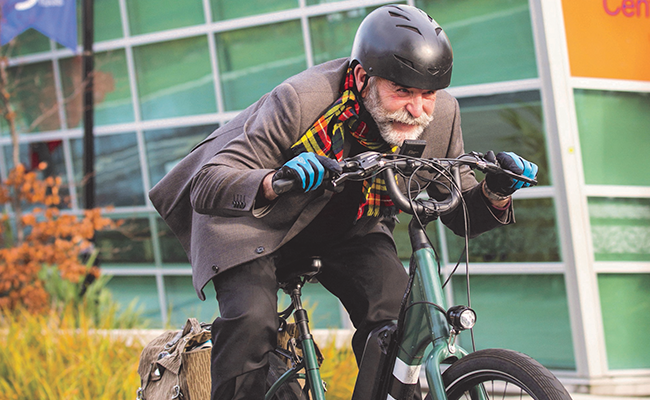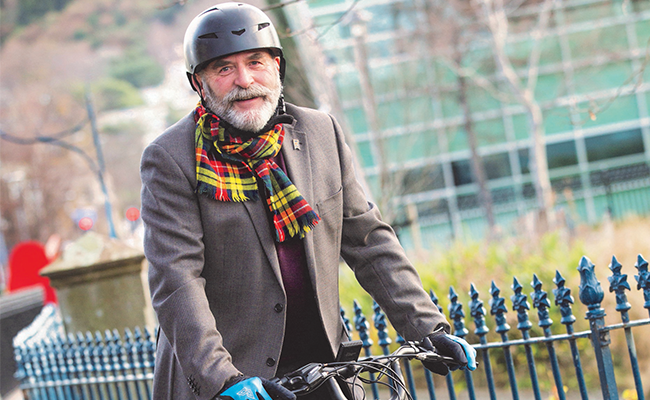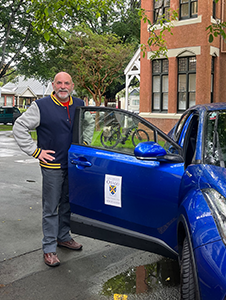Friday 17 December 2021 9:35am

A familiar image of Jamie Gilbertson on his bike. Photo: Sharron Bennett.
Jamie Gilbertson is the person the University often turns to when there is no roadmap, but he is charting his own path now, into retirement.
Asking people about the college warden who has been working on the Dunedin campus for 20 years sparks everything from tributes to banter:
“He’s one of the wisest and kindest people I know … now I’m starting to get emotional.”
“He’s a cornerstone of our University.”
“He’s a support system for a giant moustache.”
“I was really impressed with how he ran his college (Arana). It was like a large family really. Everyone was equal, there was never any sort of judgement or belittling.”
“He always puts young people first and he’s a real advocate for us supporting young people through this part of their life.”
“Jamie encouraged us all [during the pandemic] by saying 'stay in the fight,’ 'hurry up and wait,’ 'hi ho silver,’ 'big as Ben Hur,’ … and most recently, 'where's the newspaper'?”
“In challenging situations, no-one walks away with any less mana.”
“He’s larger than life. A character. He’s a real presence in a room – in a good way.”
“He’s a passionate University man.”
“He brings people together.”
“Did anyone tell you he looks like a Lorax?”
“He’s a good human being.”
Some words keep cropping up: calm, fair, pragmatic, practical, a problem solver, and fun.
All Jamie says is: “The University has been kind to me. The University has allowed me to be myself.”
Go-to-guy
With a background in the military and social work up to a national level, after his arrival on campus in 2002, Jamie quickly became a University-wide go-to for complex issues with young people, including some in unmapped territory not covered by policy or practice. That was recognised when he became Otago’s first Senior Warden for all the residential colleges in 2017.
The immigrant from South Wales who escaped lack of opportunity by sailing into Wellington on a ship and then travelling on to Dunedin with his parents and two brothers in 1957 now has flags flying in his honour above Arana College, a Welsh dragon and a Christmas celebratory flag.
He will also be finishing his career in an office metres from the University’s landmark Clocktower building: “How did that happen?,” he asks.
In the beginning
Jamie’s wife Tina spotted the ad for the Arana warden’s job – “community leadership looked really attractive to me” – and it also offered him a chance to stop working during the week in Wellington away from a family that included three young sons
“I gave myself over to college and University life. The best job I’ve ever had was being a college warden,” he says.
“Young people coming to University and finding themselves, that’s where the joy lives, and the challenge.”
People have told Jamie Arana was ‘built’ for him and “I’m grateful to have found something that suited me, not everybody does”.
In the thick of it
While taking responsibility for hundreds of other people’s teenagers can involve working huge hours and never-ending multi-tasking, “I’ve loved it. I got tired but I didn’t have trouble sustaining it – it didn’t feel like a job, it felt like a vocation. It’s been a fantastic journey. I’ve had the time of my life”.
“When you’re at the college, there’s always someone saying hello, opening a door, wanting to play a game, wanting to talk to you, having difficulty with their course, a broken bone or a broken heart, a death at home … that’s where I can help.
“Seeing people reach their potential or seeing people fall down but get up again. There’s triumphs and tragedies. There’s graduations, which are wonderous.”
Leading
When Jamie started at the helm, Arana was several older buildings with 243 residents. Now expanded, it has more than 400 residents and a waiting list – and Jamie has a reputation as one of the especially fun wardens.
While he has revelled in the “privilege” of being of service to young people as they transition into adult life and of being of service to staff through leadership, he says both roles also demand setting firm boundaries: “You can nurture but you also need to confront when required.”
For him, the aim has been “to take people with you, by listening to what they say and involving them”.
He knows Kiwis like autonomy so has always believed in providing role clarity to give people clear responsibilities, in autonomy to give them opportunities, and in accountability. But learning to say sorry as a leader has also been important: “When things go wrong, being able to listen, reflect and learn from it.”
“The other big thing is to get in and have a go.”
“My story is probably typical of a warden … the service is the same.”

Jamie will be moving to Earnscleugh with his wife Tina.
Serving
That word service crops up a lot with Jamie. Asked why, he says: “I think I come from a family with a service ethic, in the defence forces and wider community, and I think we enjoy the company of people. As immigrants from a poor background, we tried to do as well as we could in a new country and then gave back through service.”
When giving service by helping to resolve complex problems, Jamie likes to have “cadence” – walking in slowly, listening to understand, breaking complex problems into their parts, then dealing with them in a way that is safe for the University.
Balancing
He wants to protect a place where even the “by-products” of the job are magnificent.
“It’s a real community. It may as well be a little village in England. Helping people get through is the nearest thing to being the village vicar that I could do,” he says.
And the environment is beautiful: “Walking through the campus with my wife every morning, every season.”
That all helps Jamie maintain “balance in my head and my heart” when times are tough for his charges, along with connecting to his great network across campus, getting outdoors, and being with family and friends.
“I also have a sleep every now and then to catch up.”
Chancing
The University has given him “unique opportunities” as well.
One is being its voice, literally, on radio ads. He sees that as trying to demystify university so young people are not intimidated, helping to make them comfortable about applying to come.
The opportunity to meet fantastic academics, professional staff, and students has come with the job too, and so did being involved in the “really exciting” multi-million-dollar building project at Arana, which led to simultaneously opening three facilities for the 2006 year: Leithview for 60 residents, Rawiri for 100, and a new kitchen, dining room and common rooms.
The way Jamie and his management team handled the year of construction won them a University staff award for Exceptional Performance, in 2006. Jamie says he has been lucky to have nearly all the same staff for his entire time at Arana.
He has also been on the Collegiate Way International Advisory Board, chaired the University’s Board of Studies for Science Communication, been an executive member of the Ethical Behaviour Group, and on the Vice-Chancellor’s Code of Conduct Committee, on the advisory and philanthropic Stuart Residence Halls Council, the Limitation of Enrolment Committee and the team that wrote our University’s sexual misconduct policy.
Battling
If Jamie sounds grateful and reflective rather than in story-telling mode, he is. After successfully fighting off prostate cancer in 2015 he was shocked earlier this year to discover he had colorectal cancer that had spread to his lung, sending him on a “huge and difficult journey” of radiotherapy, chemotherapy, and surgery, with the distinct possibility he would die anyway.
“Lightening does strike twice. It was a very challenging first couple of weeks.”
Jamie thought he could distract himself by continuing to work, but chemotherapy’s side-effects took him off campus within three days. He had to make a conscious decision to “set my attitude and give it my best, so I went for it. That was pretty much all I could do”.
While feeling immense vulnerability, he felt his University village wrapping around him, and the hospital’s team. From January until late September he did not know whether he would live or die, but now, “I’m cancer free and have a new lease on life. I mean to make the most of it”.
The Otago future
He is also in good heart at seeing succession planning underway – “I can see passion, commitment” – and that it is focusing on caring for students and the staff who care for them.
Jamie would also like Otago to keep advancing Māori and Pacific people, use their languages more and strengthen the commitment to the Treaty of Waitangi.
His parting advice to students is be kind, work hard, try to make a difference, have a good time, don’t take yourself too seriously and if you have any low-level symptoms that could indicate a health problem, go to your doctor.
How can he bear to leave?
“If my life is a glorious adventure, I’m closing a chapter, turning a page.”

Jamie leaving Otago.
Jamie’s future
He and Tina – his partner, wise counsel, and support for 46 years – will be moving onto her family’s orchard in Earnscleugh, to live in their own house with their own small cherry orchard.
They will be surrounded by children, tractors, dogs, and horses: “There’s always a horse looking at you or a dog trying to steal your sandwich.”
Tina will be Dunstan Hospital’s nursing director and quality manager. Jamie plans to make himself useful. He will not be a leader but will be of service in some capacity.
The legacy
Two of Jamie’s sons will be the Gilbertsons on campus now – Callum, a Property Services Division Facility Manager and Finn, a nurse at Student Health. Innes has worked at Campus Watch, will be working at the orchard over summer, and may go into allied health.
As for Jamie? He is floating ideas of enhancing native bird life, promoting native plants, and getting rid of rodents. But right now he is excited about taking a walk in the orchard every morning and riding his electric bike around the hills of Earnscleaugh.
So think of him when there’s dew on the ground, he will be outside in the crisp air, inhaling the earthy, damp smells of autumn, surrounded by bird song, and watching for the swoop of the local Kārearea (native falcon).
